- Home
- Michael Wallace
The Dark Citadel
The Dark Citadel Read online
The Dark Citadel
by
Michael Wallace
SMASHWORDS EDITION
* * * * *
PUBLISHED BY:
Michael Wallace on Smashwords
The Dark Citadel
Copyright © 2011 by Michael Wallace
Cover Art by Glendon Haddix
Smashwords Edition License Notes
This ebook is licensed for your personal enjoyment only. This ebook may not be re-sold or given away to other people. If you would like to share this book with another person, please purchase an additional copy for each person you share it with. If you're reading this book and did not purchase it, or it was not purchased for your use only, then you should return to Smashwords.com and purchase your own copy. Thank you for respecting the author's work.
Prologue
Surfeyn could no longer protect his master from thieves and vipers. Since his wife’s death, the high khalif had consulted with every manner of witch, fortune teller, wizard, and astrologer in the Eastern Khalifates. One evening, when waves began to crash over the seawall at dusk and a great storm gathered over the ocean, Surfeyn watched helplessly as the khalif turned his worried attention to their advice.
“There will be wights,” a blind hag with no eyes said as she crawled on her belly to the Iron Throne. “The Harvester will come to hunt them. You need runes or they will get into the castle. Let me help you, great one.”
“Only the catacombs will keep you safe,” said a wizard. “We will hide your passage and they will never find you.”
“No, he must consult an oracle,” said another.
Surfeyn stood next to the throne. “Send them away, Master,” he whispered. “I will draw tight the shutters and heap extra wood onto the fire. You’ll sleep quietly and there will be nothing in the morning except a few broken branches in the garden and maybe a seawall to repair.”
Khalif Ahmaad Faal gripped the throne until his hands turned white. “Typhoon season has passed. This is not the turning of the weather, this is something unnatural. I’ll need other advice tonight, old friend.”
Cragyn approached the throne. “I know what must be done, master.” He had a cunning look on his face and Surfeyn met his gaze, knowing the wizard would do something to turn this to his advantage, and knowing he was helpless to stop it.
Sheets of rain pounded against the shutters of the throne room, divided by a clap of thunder. “There are shadows entering the city, master,” Cragyn continued. “The hag is right. I can see them, they are cloaked in the storm. Veyrians shiver in their beds. From the hovels on Knacker’s Row to the manors outside the palace, they sense the wights entering the city.”
“No storm can penetrate these walls,” Surfeyn said. “And we are protected from wights. Unless someone lets them in, they’ll never get past the gates. Master, you don’t need new runes or incantations. The old ones are more than enough.”
“What does a slave know?” Cragyn asked. “Listen to me, great one, I know what you must do to protect yourself.”
“What is that, wizard?” the khalif asked.
“Drink this.” A glass goblet appeared in his hands. Blue liquid sloshed, slow and lazy, like something molten.
Before Surfeyn could protest, the wizard had lifted the goblet to Ahmaad’s lips. The khalif drank, sputtered, then drank some more. A smile passed over the wizard’s face.
“That will protect you, master. Now, leave these wretches and follow me. I’ve prepared chambers below the palace. No wight shall find you there.”
Surfeyn started to follow, but Cragyn held up a hand. The slave couldn’t move, his feet felt stiff, his limbs like stone. He opened his mouth to warn the khalif, but his tongue wouldn’t obey.
“No, do not restrain him,” the khalif said. “I would have my servant at my side. Tonight, especially.”
“As you wish, master.”
Together, the three of them left the throne room. The other wizards and astrologers voiced their protest, but a glaze had come over the khalif’s features, and he ignored them.
Barely forty years weighed on the khalif’s shoulders, but palsy and white hair made him look like a man twice his age. He supported his weight with a bronze staff. Some nights, he woke screaming like a child, his bedding soaked with sour sweat. When Surfeyn rushed to his side, the khalif would lie trembling in his guard’s arms for hours before he could sleep again.
They found their way into the bowels of the Grand Palace. Hundreds of years old, the palace squatted atop the volcanic rock that rose from the center of Veyre. Some said King Toth himself had built the palace, after his senses had fled. Indeed, only a madman could have built such a jumble of rooms, alleyways and staircases. And in the palace underbelly, tunnels and secret apartments wormed deep into the rock.
The upper palace had apartments for several hundred to live comfortably. Some khalifs and khalifas kept rooms for nobles, to keep their scheming under watchful eye, but during the last few years, Ahmaad Faal had forced the nobles into their own family manors. He kept the palace emptied of all but his slaves and advisers. The khalif’s vizier ordered unused wings and passageways walled off, while in other corners, Cragyn practiced his dark arts.
The khalif stopped in front of the doors to the catacombs, and Surfeyn, misunderstanding the hesitation, opened the door with sword drawn, as pleased his master. “No, Surfeyn.” Ahmaad glanced over his shoulder, eyes narrowed. “Cragyn has prepared the way. There is no need for the sword.”
Displeased, Surfeyn bowed until the tassels of his turban swept the floor. “As you wish, my master. May you live forever.”
Ahmaad’s lips turned in a slight smile, then he glanced back at the hall, cast in flickering torch light. “Live forever? To survive the night will suffice. By the Brothers, I saw the Harvester in a dream last night, come to gather my soul. I sense your displeasure. Come, trust me tonight.”
The wizard led Ahmaad and his bodyguard into the catacombs, chill and dank beneath the palace dungeons. They passed below the catacombs, into mad King Toth’s secret apartments and passageways. Small creatures scrabbled and hissed in the darkness, but fled when Surfeyn drew too close with his torch. At last Cragyn led them to the rooms he had prepared. He bowed, then scuttled back into the darkness in the direction from which they'd come. Surfeyn watched him go with a sense of release. There was no sound but their own breathing and the crackling of the torch.
Surfeyn drew the khalif inside, then lit the candles set out by the wizard, dipped from strange-smelling wax that burned with ghostly blue light. He helped Ahmaad ready himself for bed, then covered him with several blankets.
Ahmaad gripped his wrist with a palsied hand. “Stay awake, my friend.”
Surfeyn bowed low, ignoring the blue foam that flecked his master’s lips. “Yes, master.” He drew his scimitar and turned to guard the door.
Surfeyn hated himself for despising the khalif at moments like this. He reminded himself of the man Ahmaad Faal had once been. He’d rebuilt the aqueducts, driven the stone giants back to the mountains, and commissioned seven new cities to reap the trade flowing east along the Tothian Way. He’d commanded such respect and love from the other khalifs of the eastern plains that they’d crowned him high khalif, with the power to tax their cities and command their armies. When Josiah Saffa, former enemy of Veyre, gave his favorite daughter Tainara to Ahmaad Faal for wife, the people of both cities celebrated for two weeks. Ahmaad built the famous hanging gardens to honor his new bride.
Tainara Saffa lacked the beauty of her sisters, but as a queen she had no equal. She loved the people, and turned her husband’s heart to mercy. He lowered taxes in her name, forgave debts at her request. On their fifth anniversary, he emptied the treasury to
feed the poor, just as the five brothers had fed the world with the work of their creation. That night, an assassin poisoned Tainara’s wine. Two days later, the khalifa lay atop a tower of silence outside of Veyre, her bones picked clean by ravens and vultures.
Surfeyn’s heart tightened in grief. Had it really been ten years? So long, but such a short time for a king to wither and die. To give the scepter of power to his wizard and his vizier to rule in his stead.
Surfeyn heard a noise in the hallway outside the door. It began as a whisper, followed by the patter of feet and a chill breeze that bled through the key hole. He drew his sword and climbed to his feet.
He peered through the key hole, cursing the paranoia that kept the khalif from guarding his rooms with an entire regiment, as he’d once guarded the rooms of his wife. Still, Surfeyn had killed assassins before and might yet preserve the khalif’s life. But what he saw clenched his stomach with fear.
Wights. At least ten of them, glowing with a pale blue light, milling outside the door as if waiting for something or someone to come. What could bind so many at one time? Only dark magic could keep so many hidden from the Harvester, who collected the souls of the dead lest they pollute the world with their madness. Surfeyn pulled back and looked for something to block the door.
The door rocked backwards with a terrific blow. Behind, Ahmaad sat up straight in his bed. “The Harvester,” he whispered, drawing his blankets up to his neck. His face paled and his hands trembled. “Don’t let him take me.”
No, not the Harvester. Surfeyn would have welcomed the dark gatherer’s presence now, as the wights would flee if he appeared. Surfeyn braced himself.
The door rocked backwards again. Splinters burst outward and the hinges sagged. Again and again the door rocked until at last it burst open in a shower of splinters.
Wights poured into the room, setting into him with teeth and claws. He drove them back with his sword. He chopped the head of one from its shoulders and it dissolved with a scream, then fled like a shadow back to the halls. Not dead, but rendered harmless. He destroyed another, and the rest hesitated
And then she stepped into the room. Unlike the crippled wights surrounding her, she stood taller than she had in life, a tiara blazing on her forehead. She who had once commanded every khalifate from here to the mountains. She who had once ruled the khalif’s own heart with love and tender advice. She reached out a pale blue hand to point at Surfeyn. “Out of my way, worm.”
“Tainara,” the khalif whispered behind Surfeyn, his voice a mixture of awe and horror. “You’ve come for me.”
“Yes, my dear. I’ve come to take you away from this frail body,” she said, her voice so deadly beautiful that Surfeyn wept under its power.
At last Surfeyn understood. The blue candles, the blue poison given the khalif at dinner, the blue light cast by the wights. Cragyn. The wizard meant not only to kill the king but to bind his soul. Yes, much as he must have done to the khalifa herself. Corrupted her strength and goodness with dark magicks.
Surfeyn tore himself from Tainara’s spell. He let out a terrible cry and swung his sword at her head. But the other wights reached him first, driving him to the ground. They stripped the sword from his hands and ripped at his face and belly. Surfeyn stood no chance.
The queen stepped toward her husband with outstretched hands. In one palm lay a dagger. Ahmaad Faal’s eyes widened in horror and madness. She clasped him in a deadly embrace.
And thus was the high khalif murdered in his bed. Murdered and bound into the service of Cragyn the Wizard. And such had grown the wizard’s power that none in Veyre dared challenge his right to the Iron Throne. The other cities of the eastern plain shortly fell under his sway. Soon, he turned his attentions to the western khalifates and to controlling the length of the Tothian Way, all the way to the Citadel lying over the mountains.
Chapter One
Before the corrections guild sold his family into slavery, laughter and beautiful things filled Darik’s life. Every year, his father acquired more slaves and servants to buy and sell his wares, and every year he added to his shops in the heart of the Merchant Quarter. Men came to his father to borrow money or beg his support of claims against the other guilds. There was even talk that the grand vizier would appoint him to guildmaster, Balsalom’s most powerful position outside the walls of the palace. The khalifa herself invited Darik’s parents to the Feast of Summer’s Eve at the palace.
At the height of their wealth, Darik and his parents moved from their house on the edge of the quarter to a lavish three story manor with a courtyard, gardens, and forty slaves. Father tore down the manor to the east and built a children’s garden in its place.
And then, after three failed birthings, Darik’s mother gave birth to his sister Kaya. She was a beautiful child, with eyes like her mother’s, but her birth cost Darik’s mother her life, and would soon cost the family their fortunes.
Darik spent most of his time after the year of his fourteenth birthday in the garden, losing himself in daydreams among the statues of griffins and giants and other strange and wondrous beasts. Wild roses tangled the walls, and monkeys chattered in the trees as they fought over figs pilfered from the kitchens. Sometimes he fell asleep in the shade and dreamt of his mother holding him in her arms. That year was like a glass of fermented coconut milk, both sweet and bitter at the same time.
The family’s fortunes held the first year after his mother’s death, then collapsed. Darik heard rumors of bad loans, of trading partners cheating his father, of caravans lost on the Tothian Way as it snaked through the mountains. Father retreated to his rooms and drank too much wine.
Darik soon learned what the rest of the household thought of his father. Darik and the stablemaster’s daughter, a pretty girl with curly black hair named Lassa, had gone to the stable lofts. Lassa was a year older than he and Darik noticed her swelling breasts every time he passed her in the stables. How long had she worked in the stables with her father? He had no memory of her until a few months earlier. Perhaps she had lived elsewhere, but he thought it likely that he had simply never noticed her before.
One afternoon she had whispered to him while he brushed his horse, and beckoned wickedly for him to follow her up to the loft. Darik obeyed, heart pounding as he climbed the ladder behind her, watching her hips swaying seductively with every step.
Up in the loft she pushed him into the hay and kissed him hard on the mouth. Her scent mingled with the sweet smell of fresh hay. Startled, he pulled away. He scrambled toward the ladder. But when he turned around to climb down, she pulled her robe down from her shoulders to bare her breasts. She grabbed his hand and put it on her breast, pulling at his tunic with a shocking urgency. Her touch was like fire against his skin and he felt a sudden shame.
Voices sounded below and Darik sat upright. He straightened his tunic. Had the stablemaster followed them? The stablemaster had a terrible temper, raging against the hands when they reported late for work. Darik feared the man would beat him senseless for daring to touch his daughter. Lassa giggled and Darik put his hand over her mouth to quiet the foolish girl.
It was the stablemaster, but he wasn’t looking for his daughter. He spoke instead with another man, so loud and brash that it was clear that he meant to hide no secret. And he spoke treason against the family.
“Not a bad offer,” the stablemaster mused. “Yes, I think I’ll accept. Kerack has nothing but nags in his stables anymore. There’s nothing for me here.”
“The offer is only good if you bring along Kerack’s chief cook. My master has taken a liking to the cook’s game hen pie. You are friends with the cook, aren’t you?”
“Oh yes,” the stablemaster said. “If I tell him to come, he’ll come.”
“How long?” the other man asked. Darik looked through the wooden slats in the loft. The other man wore the purple robes of a master merchant’s chief steward. Sent by one of Father’s rivals? Or maybe even a friend. None of his father’s friends amounte
d to much these days.
“A fortnight, no more.” The stablemaster grinned. “Long enough to pay a final visit to my favorite wenches in the kitchens.”
The other man laughed. “And what if you leave, and Kerack rights the Nendra family fortunes? There was a time when people thought he’d rise to guildmaster when the khalifa tires of Fenerath’s petulance.”
“Nah, they’re finished,” the stablemaster said. “Give them a year and the Nendras will be no higher or lower than any other family in the guild.”
The girl grabbed Darik to pull him into the hay again, but he pushed her aside. He climbed down the ladder with an angry curse, completely forgetting that the stablemaster’s daughter still lay half naked upstairs.
“Go then,” he shouted at the stablemaster. He picked up a clod of dried horse dung and hurled it. The dung struck the stunned man directly on the forehead. “Leave, if you’re so anxious to betray your master! Or stay and muck stalls because your days as stablemaster are finished.” Darik ran from the stables, face flushed with rage.
Later that afternoon when Darik approached Father with news of the man’s treacherous words, Father merely sighed and turned to looking out the window at the courtyard. He’d had a statue of mother built and he liked to look at it. Father poured himself another glass of wine and sent Darik away.
As it turned out, the stablemaster was wrong. Within a year, the family dropped much lower than the merchants who Father had once called friends. Rather than selling some of his markets and property to satisfy debts, father determined to cling to his status as long as possible. He borrowed more and more, convinced that his fortune would turn. Soon, debts mounted so high that moneylenders refused to grant new funds, and voracious interest payments ate every dinar he earned and then some.
At last, angry merchants cast him from the guild, and with no license, he couldn’t buy or sell goods. Even then he might have salvaged the family honor if he had sold everything at once, satisfied his debts and begged mercy from the guild. Instead, he wasted time appealing to his friend the grand vizier. The vizier was sympathetic, but he needed the guilds to raise tax money to finance the new tower to honor the fifth year of the khalifa’s reign. By the time father decided to sell it was too late. He found no buyer before the guildmaster moved against them.

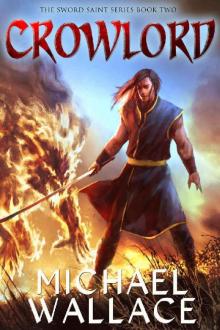 Crowlord (The Sword Saint Series Book 2)
Crowlord (The Sword Saint Series Book 2) Crowlord
Crowlord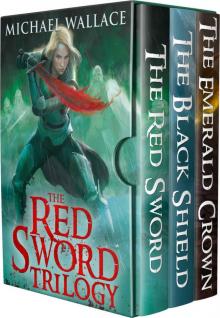 The Red Sword- The Complete Trilogy
The Red Sword- The Complete Trilogy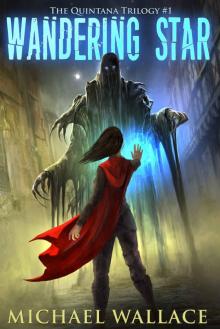 Wandering Star (The Quintana Trilogy Book 1)
Wandering Star (The Quintana Trilogy Book 1)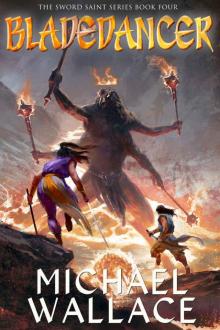 Bladedancer
Bladedancer Sword Saint
Sword Saint The Alliance Trilogy
The Alliance Trilogy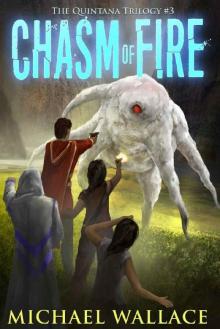 Chasm of Fire
Chasm of Fire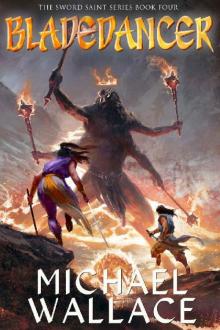 Bladedancer (The Sword Saint Series Book 4)
Bladedancer (The Sword Saint Series Book 4) The Devil's Deep
The Devil's Deep Shadow Walker (The Sword Saint Series Book 3)
Shadow Walker (The Sword Saint Series Book 3) Starship Blackbeard
Starship Blackbeard The McHenry Inheritance (Quill Gordon Mystery Book 1)
The McHenry Inheritance (Quill Gordon Mystery Book 1) Sun King (The Void Queen Trilogy Book 3)
Sun King (The Void Queen Trilogy Book 3) Blood of Vipers
Blood of Vipers Righteous - 01 - The Righteous
Righteous - 01 - The Righteous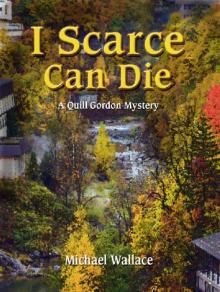 I Scarce Can Die (Quill Gordon Mystery Book 5)
I Scarce Can Die (Quill Gordon Mystery Book 5) The Devil's Cauldron
The Devil's Cauldron The Wicked (The Righteous)
The Wicked (The Righteous) Crow Hollow
Crow Hollow Righteous03 - The Wicked
Righteous03 - The Wicked Righteous02 - Mighty and Strong
Righteous02 - Mighty and Strong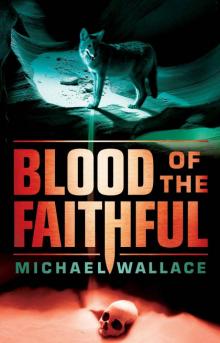 Blood of the Faithful
Blood of the Faithful Wash Her Guilt Away (Quill Gordon Mystery Book 2)
Wash Her Guilt Away (Quill Gordon Mystery Book 2) The Kingdom of the Bears
The Kingdom of the Bears The Emerald Crown (The Red Sword Trilogy Book 3)
The Emerald Crown (The Red Sword Trilogy Book 3)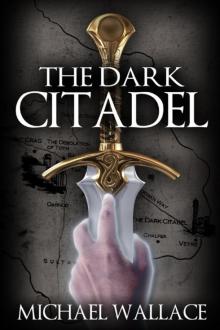 The Dark Citadel
The Dark Citadel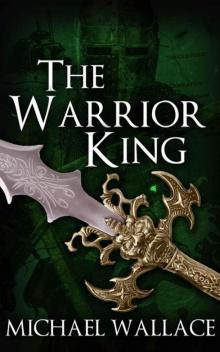 The Warrior King (Book 4)
The Warrior King (Book 4) Rebellion of Stars (Starship Blackbeard Book 4)
Rebellion of Stars (Starship Blackbeard Book 4) Righteous04 - The Blessed and the Damned
Righteous04 - The Blessed and the Damned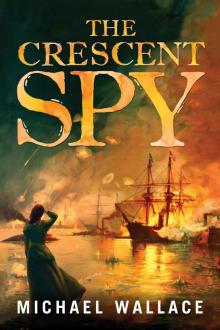 The Crescent Spy
The Crescent Spy Queen of the Void (The Void Queen Trilogy Book 1)
Queen of the Void (The Void Queen Trilogy Book 1)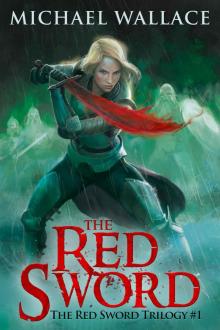 The Red Sword (The Red Sword Trilogy Book 1)
The Red Sword (The Red Sword Trilogy Book 1) The Sentinel (The Sentinel Trilogy Book 1)
The Sentinel (The Sentinel Trilogy Book 1)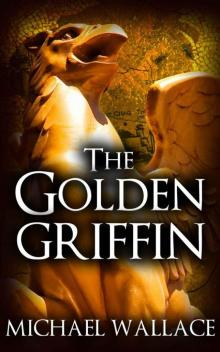 The Golden Griffin (Book 3)
The Golden Griffin (Book 3) The Blessed and the Damned (Righteous Series #4)
The Blessed and the Damned (Righteous Series #4) Hell's Fortress
Hell's Fortress Not Death, But Love (Quill Gordon Mystery Book 3)
Not Death, But Love (Quill Gordon Mystery Book 3) Destroying Angel
Destroying Angel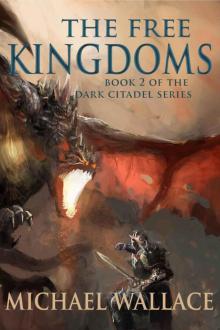 The Free Kingdoms (Book 2)
The Free Kingdoms (Book 2) Dragon Quadrant (The Sentinel Trilogy Book 2)
Dragon Quadrant (The Sentinel Trilogy Book 2) Shattered Sun (The Sentinel Trilogy Book 3)
Shattered Sun (The Sentinel Trilogy Book 3)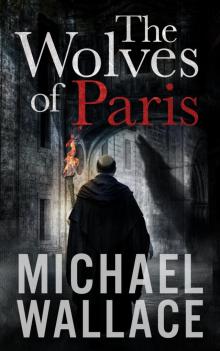 The Wolves of Paris
The Wolves of Paris Lords of Space (Starship Blackbeard Book 2)
Lords of Space (Starship Blackbeard Book 2) Dreadnought (Starship Blackbeard Book 3)
Dreadnought (Starship Blackbeard Book 3) The Village of Dead Souls: A Zombie Novel
The Village of Dead Souls: A Zombie Novel The Black Shield (The Red Sword Book 2)
The Black Shield (The Red Sword Book 2) The Daughters Of Alta Mira (Quill Gordon Mystery Book 4)
The Daughters Of Alta Mira (Quill Gordon Mystery Book 4) Mighty and Strong (The Righteous)
Mighty and Strong (The Righteous)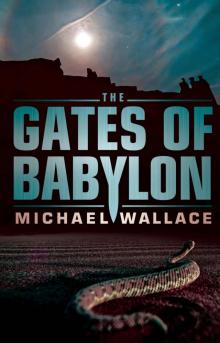 The Gates of Babylon
The Gates of Babylon